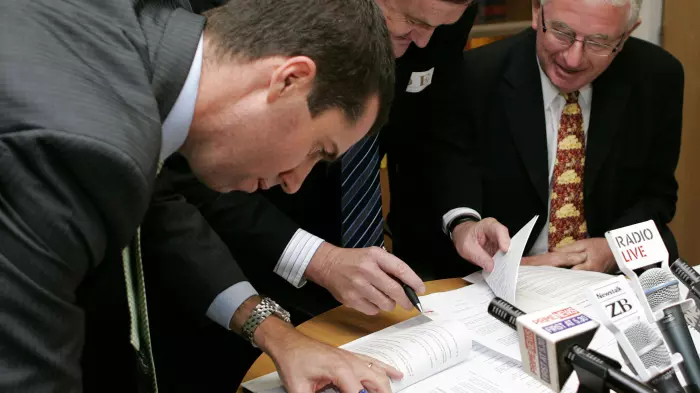It seems a near certainty that former high-flyer Eric Watson’s crash back to earth will see him bankrupted.
The high court in Auckland this week accepted a $57.5 million summary judgment against him and since then the liquidators for the Cullen group of companies, Leon Bowker and Luke Norman have confirmed they plan to bankrupt Watson.
There’s no indication how long they’ll give him, but given his lack of engagement in New Zealand proceedings in recent years, it’s hard to see him bothering to oppose it.
And to be honest, can you really blame him?
He’s already lost the Inland Revenue Department’s major claim against his group as it seeks to claw back what it thinks is tax Cullen should have paid in the early 2000s. That was when his entities made $291m of related-party loans via the Cayman Islands when he moved to the UK and gained some degree of notoriety in a scuffle with Hollywood bad boy and fellow Kiwi expat Russell Crowe.
He was slapped down in what would’ve been a draining battle with former business partner Owen Glenn – never one to back down from a fight – and ordered to pay £43.5m (NZ$82.9m) when their Spartan Capital joint venture broke down after Watson breached his fiduciary duties.
Doing porridge
Watson’s rock bottom was probably in 2020 when he was found in contempt of court for breaching court orders relating to the dispute and was sentenced to four months in prison.
As he told the NZ Herald this week, bankruptcy didn’t hold the same fear for him after his lag. And to be fair, maybe it shouldn’t.
The Official Assignee asked for help from overseas courts in the bankruptcy administration of another country, but that’s no guarantee of being able to squeeze blood from a stone.
Which makes you wonder what the point of it all is.
IRD gave the liquidators $100,000 upfront to kickstart the administration three years ago, of which they took $16,000. Another $83,000 or so went into legal fees. Of the other $514,530 that has been spent, the liquidators have been paid $169,740, and they have racked up $1.3m of fees.
The tax department had previously sought to claw back $7 for every $1 spent in its audit investigations, but is changing that measure in the coming years to identify the value of compliance activities over associated costs.
Under the previous measure, it only has to recover $700,000, plus whatever it spent on the initial action times seven, which shouldn’t be too much of a stretch.
Which still begs the question – why the vigorous pursuit over 20-year-old unpaid tax that will likely face a shortfall?
Record run
The tax department has had a stellar run of success prosecuting errant taxpayers over the past 15 years, whether it be the artificial nonsense of the Penny and Hooper tax transactions, the blatant tax minimisation of the banks through their structured finance transactions, or the use of debt-and-equity hybrids to monkey with deductions.
Its overtures against Big Tech – which has the heft of the hand-wringing rich country club of the OECD – has yielded increased tax receipts from the likes of Apple, Google and friends, although the level of related party sales still always makes one gag at how much domestic activity is being recorded elsewhere.
If that level of success dictates the tax department flex its muscles to show that it’s not scared of the historically litigious if somewhat bereft of resources Watson, it makes you wonder why it hasn’t gone the whole hog and charged him with tax evasion.
Sure, tax evasion comes with the criminal sanction – and higher burden of proof – but if the IRD was of the view that Watson’s Cullen Group intentionally didn’t pay the correct amount of tax, you’d have to think this might have been just the case on which to bare its teeth.
The tax department doesn’t seem to have too many issues pursuing the small end of town for tax evasion. Small business owners who don’t pay their staff's income tax or GST often crop up in district court judgments.
That’s not to say the IRD doesn’t go after bigger fish. Property development firm Tower City Holdings was tipped into liquidation a few years ago when the tax department believed it evaded millions in tax. Still, it's easy to think that the tax department will take the easy route in chasing a taxpayer for evasion and drop that down to unlawful avoidance to get a result against a well-heeled adversary.
Given Watson didn’t skimp on his advisers when making the big shift overseas at the turn of the millennium, it’s hard to see the tax department wanting a pound of flesh when pennies will probably do.
Especially when securing a conviction is anything but a sure thing. Even Owen Glenn has struggled to get much further than his symbolic victory over his ex-partner.
Watson avoided being dragged into the $18m settlement by Hanover Finance directors and its insurer – a deal that as usual precluded any admission of liability by his former fellows – and a cut a deal with the US Securities and Exchange Commission many years earlier over trading McCollam Printers shares.
Bankruptcy might not be the schadenfreude some people want, but if regulators and enforcement agencies are going to keep playing the odds, players like Watson are going to keep challenging them.














